SBM4203 Management Information Systems: A Detailed Reflection
VerifiedAdded on 2023/03/23
|6
|1537
|73
Essay
AI Summary
This essay presents a student's reflection on the SBM4203 Management Information Systems (MIS) module. It explores the practical application of MIS in manufacturing, medical, and education sectors, discussing the advantages and disadvantages of Enterprise Resource Planning (ERP) systems, particularly SAP R/3. The reflection also delves into the role of Artificial Intelligence (AI) in knowledge management, citing examples like AI-assisted surgery. Furthermore, it addresses the legal and ethical perspectives of MIS, focusing on employee online activity monitoring and privacy concerns. The essay concludes by reflecting on the importance of ethical training and counseling to address immoral online behavior, emphasizing the preservation of employee privacy rights as outlined in the Privacy Act 1988. The student successfully reflects on various aspects of MIS implementation and its implications within organizations.
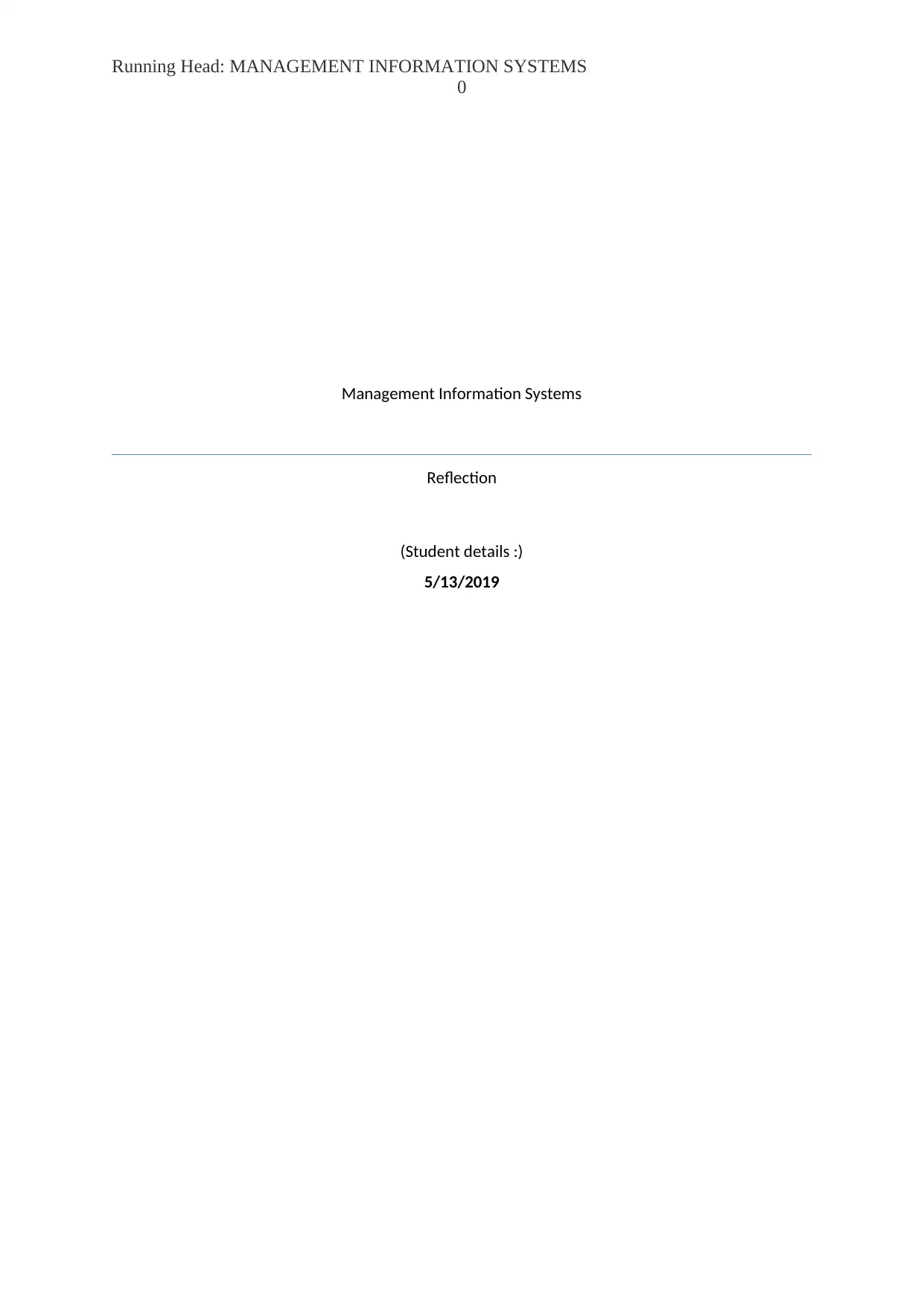
Running Head: MANAGEMENT INFORMATION SYSTEMS
0
Management Information Systems
Reflection
(Student details :)
5/13/2019
0
Management Information Systems
Reflection
(Student details :)
5/13/2019
Paraphrase This Document
Need a fresh take? Get an instant paraphrase of this document with our AI Paraphraser
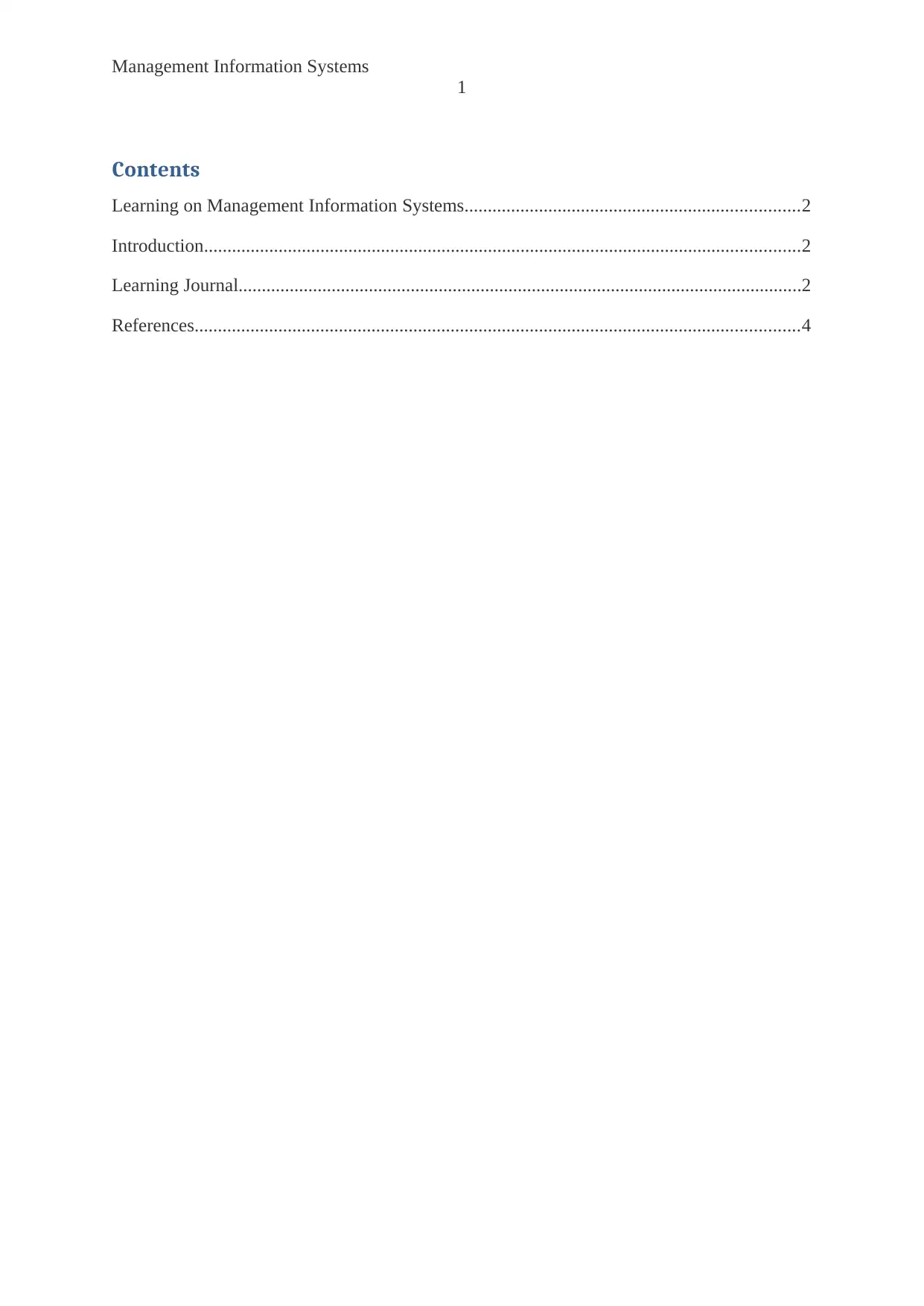
Management Information Systems
1
Contents
Learning on Management Information Systems........................................................................2
Introduction................................................................................................................................2
Learning Journal.........................................................................................................................2
References..................................................................................................................................4
1
Contents
Learning on Management Information Systems........................................................................2
Introduction................................................................................................................................2
Learning Journal.........................................................................................................................2
References..................................................................................................................................4
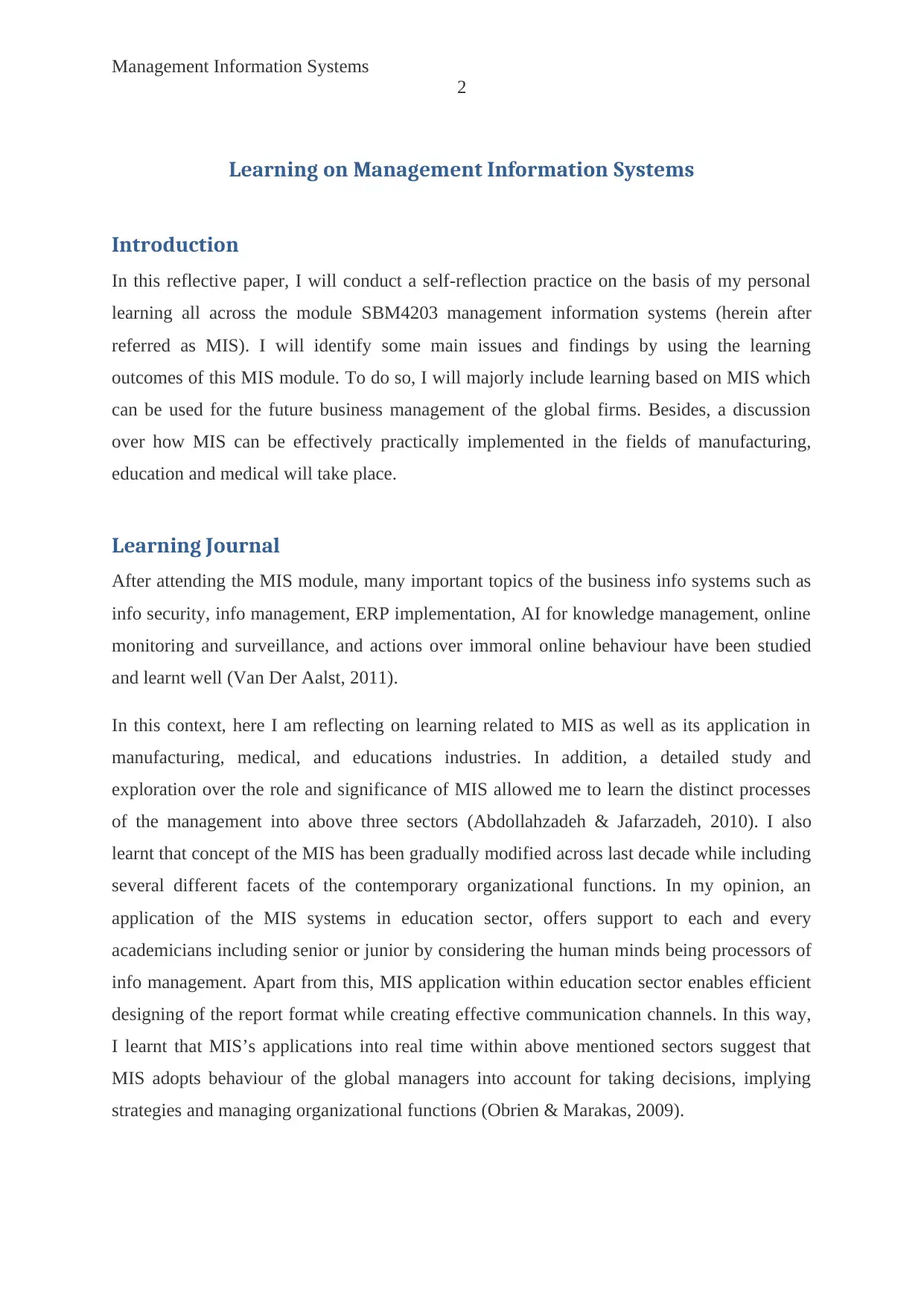
Management Information Systems
2
Learning on Management Information Systems
Introduction
In this reflective paper, I will conduct a self-reflection practice on the basis of my personal
learning all across the module SBM4203 management information systems (herein after
referred as MIS). I will identify some main issues and findings by using the learning
outcomes of this MIS module. To do so, I will majorly include learning based on MIS which
can be used for the future business management of the global firms. Besides, a discussion
over how MIS can be effectively practically implemented in the fields of manufacturing,
education and medical will take place.
Learning Journal
After attending the MIS module, many important topics of the business info systems such as
info security, info management, ERP implementation, AI for knowledge management, online
monitoring and surveillance, and actions over immoral online behaviour have been studied
and learnt well (Van Der Aalst, 2011).
In this context, here I am reflecting on learning related to MIS as well as its application in
manufacturing, medical, and educations industries. In addition, a detailed study and
exploration over the role and significance of MIS allowed me to learn the distinct processes
of the management into above three sectors (Abdollahzadeh & Jafarzadeh, 2010). I also
learnt that concept of the MIS has been gradually modified across last decade while including
several different facets of the contemporary organizational functions. In my opinion, an
application of the MIS systems in education sector, offers support to each and every
academicians including senior or junior by considering the human minds being processors of
info management. Apart from this, MIS application within education sector enables efficient
designing of the report format while creating effective communication channels. In this way,
I learnt that MIS’s applications into real time within above mentioned sectors suggest that
MIS adopts behaviour of the global managers into account for taking decisions, implying
strategies and managing organizational functions (Obrien & Marakas, 2009).
2
Learning on Management Information Systems
Introduction
In this reflective paper, I will conduct a self-reflection practice on the basis of my personal
learning all across the module SBM4203 management information systems (herein after
referred as MIS). I will identify some main issues and findings by using the learning
outcomes of this MIS module. To do so, I will majorly include learning based on MIS which
can be used for the future business management of the global firms. Besides, a discussion
over how MIS can be effectively practically implemented in the fields of manufacturing,
education and medical will take place.
Learning Journal
After attending the MIS module, many important topics of the business info systems such as
info security, info management, ERP implementation, AI for knowledge management, online
monitoring and surveillance, and actions over immoral online behaviour have been studied
and learnt well (Van Der Aalst, 2011).
In this context, here I am reflecting on learning related to MIS as well as its application in
manufacturing, medical, and educations industries. In addition, a detailed study and
exploration over the role and significance of MIS allowed me to learn the distinct processes
of the management into above three sectors (Abdollahzadeh & Jafarzadeh, 2010). I also
learnt that concept of the MIS has been gradually modified across last decade while including
several different facets of the contemporary organizational functions. In my opinion, an
application of the MIS systems in education sector, offers support to each and every
academicians including senior or junior by considering the human minds being processors of
info management. Apart from this, MIS application within education sector enables efficient
designing of the report format while creating effective communication channels. In this way,
I learnt that MIS’s applications into real time within above mentioned sectors suggest that
MIS adopts behaviour of the global managers into account for taking decisions, implying
strategies and managing organizational functions (Obrien & Marakas, 2009).
⊘ This is a preview!⊘
Do you want full access?
Subscribe today to unlock all pages.

Trusted by 1+ million students worldwide
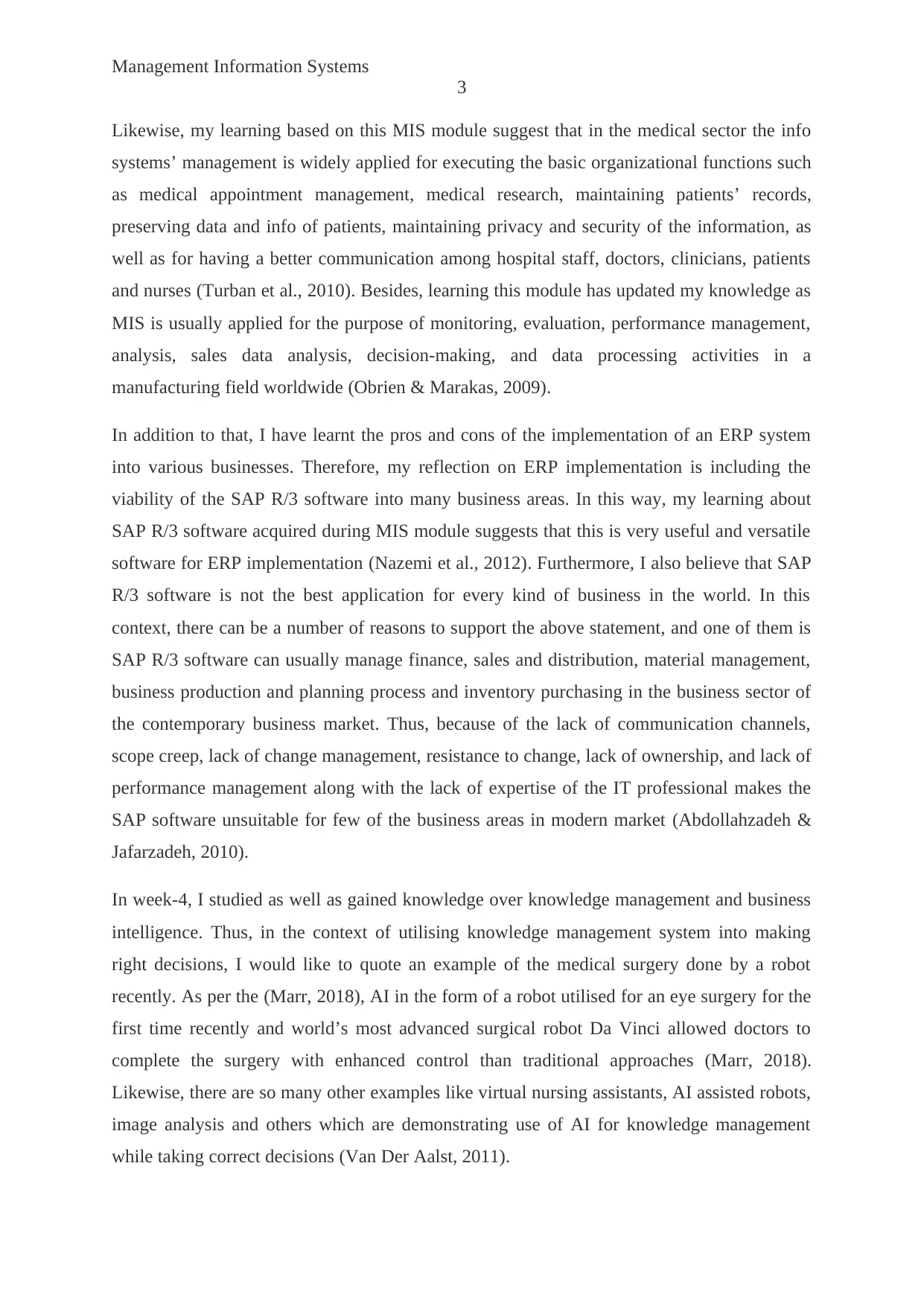
Management Information Systems
3
Likewise, my learning based on this MIS module suggest that in the medical sector the info
systems’ management is widely applied for executing the basic organizational functions such
as medical appointment management, medical research, maintaining patients’ records,
preserving data and info of patients, maintaining privacy and security of the information, as
well as for having a better communication among hospital staff, doctors, clinicians, patients
and nurses (Turban et al., 2010). Besides, learning this module has updated my knowledge as
MIS is usually applied for the purpose of monitoring, evaluation, performance management,
analysis, sales data analysis, decision-making, and data processing activities in a
manufacturing field worldwide (Obrien & Marakas, 2009).
In addition to that, I have learnt the pros and cons of the implementation of an ERP system
into various businesses. Therefore, my reflection on ERP implementation is including the
viability of the SAP R/3 software into many business areas. In this way, my learning about
SAP R/3 software acquired during MIS module suggests that this is very useful and versatile
software for ERP implementation (Nazemi et al., 2012). Furthermore, I also believe that SAP
R/3 software is not the best application for every kind of business in the world. In this
context, there can be a number of reasons to support the above statement, and one of them is
SAP R/3 software can usually manage finance, sales and distribution, material management,
business production and planning process and inventory purchasing in the business sector of
the contemporary business market. Thus, because of the lack of communication channels,
scope creep, lack of change management, resistance to change, lack of ownership, and lack of
performance management along with the lack of expertise of the IT professional makes the
SAP software unsuitable for few of the business areas in modern market (Abdollahzadeh &
Jafarzadeh, 2010).
In week-4, I studied as well as gained knowledge over knowledge management and business
intelligence. Thus, in the context of utilising knowledge management system into making
right decisions, I would like to quote an example of the medical surgery done by a robot
recently. As per the (Marr, 2018), AI in the form of a robot utilised for an eye surgery for the
first time recently and world’s most advanced surgical robot Da Vinci allowed doctors to
complete the surgery with enhanced control than traditional approaches (Marr, 2018).
Likewise, there are so many other examples like virtual nursing assistants, AI assisted robots,
image analysis and others which are demonstrating use of AI for knowledge management
while taking correct decisions (Van Der Aalst, 2011).
3
Likewise, my learning based on this MIS module suggest that in the medical sector the info
systems’ management is widely applied for executing the basic organizational functions such
as medical appointment management, medical research, maintaining patients’ records,
preserving data and info of patients, maintaining privacy and security of the information, as
well as for having a better communication among hospital staff, doctors, clinicians, patients
and nurses (Turban et al., 2010). Besides, learning this module has updated my knowledge as
MIS is usually applied for the purpose of monitoring, evaluation, performance management,
analysis, sales data analysis, decision-making, and data processing activities in a
manufacturing field worldwide (Obrien & Marakas, 2009).
In addition to that, I have learnt the pros and cons of the implementation of an ERP system
into various businesses. Therefore, my reflection on ERP implementation is including the
viability of the SAP R/3 software into many business areas. In this way, my learning about
SAP R/3 software acquired during MIS module suggests that this is very useful and versatile
software for ERP implementation (Nazemi et al., 2012). Furthermore, I also believe that SAP
R/3 software is not the best application for every kind of business in the world. In this
context, there can be a number of reasons to support the above statement, and one of them is
SAP R/3 software can usually manage finance, sales and distribution, material management,
business production and planning process and inventory purchasing in the business sector of
the contemporary business market. Thus, because of the lack of communication channels,
scope creep, lack of change management, resistance to change, lack of ownership, and lack of
performance management along with the lack of expertise of the IT professional makes the
SAP software unsuitable for few of the business areas in modern market (Abdollahzadeh &
Jafarzadeh, 2010).
In week-4, I studied as well as gained knowledge over knowledge management and business
intelligence. Thus, in the context of utilising knowledge management system into making
right decisions, I would like to quote an example of the medical surgery done by a robot
recently. As per the (Marr, 2018), AI in the form of a robot utilised for an eye surgery for the
first time recently and world’s most advanced surgical robot Da Vinci allowed doctors to
complete the surgery with enhanced control than traditional approaches (Marr, 2018).
Likewise, there are so many other examples like virtual nursing assistants, AI assisted robots,
image analysis and others which are demonstrating use of AI for knowledge management
while taking correct decisions (Van Der Aalst, 2011).
Paraphrase This Document
Need a fresh take? Get an instant paraphrase of this document with our AI Paraphraser
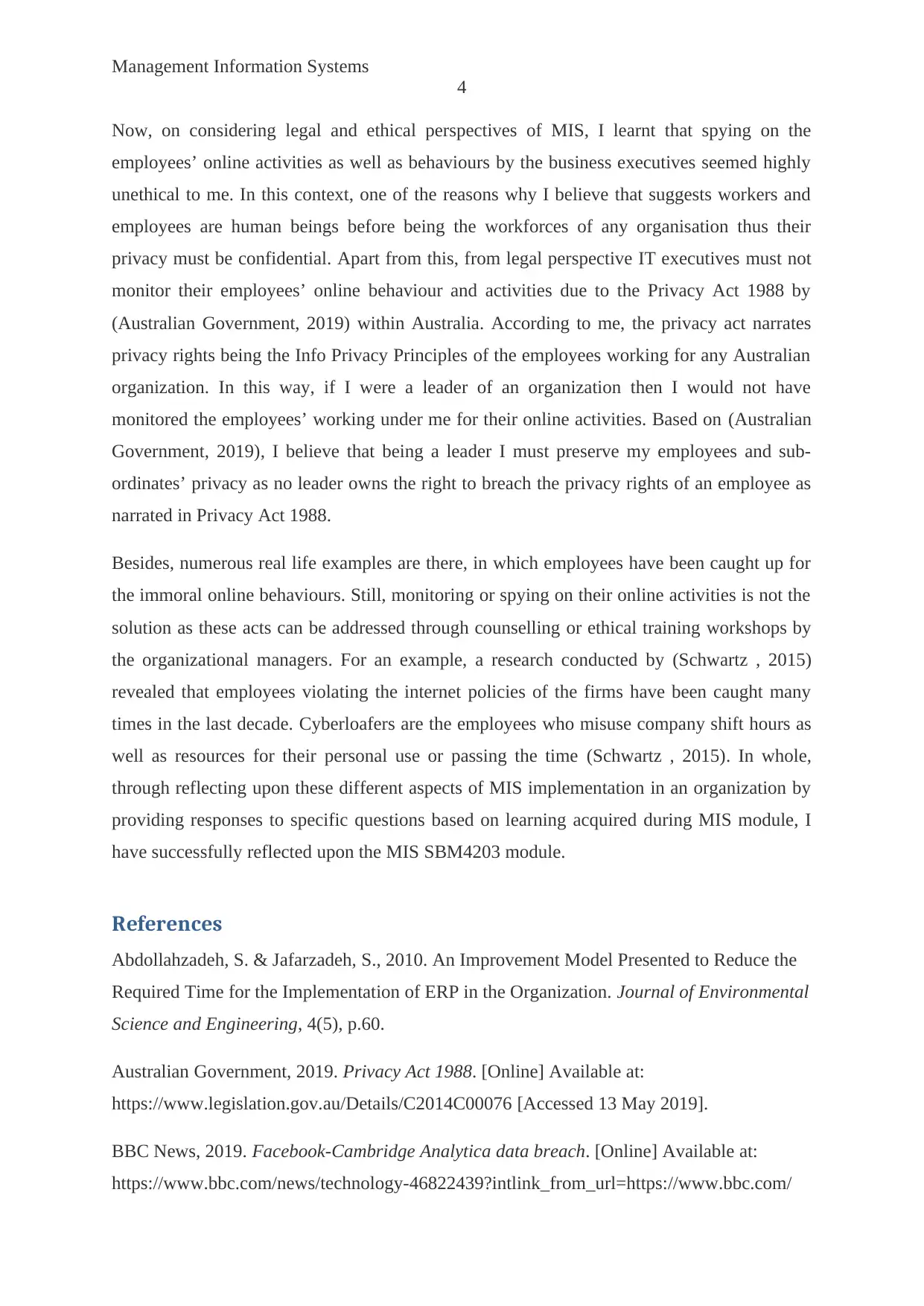
Management Information Systems
4
Now, on considering legal and ethical perspectives of MIS, I learnt that spying on the
employees’ online activities as well as behaviours by the business executives seemed highly
unethical to me. In this context, one of the reasons why I believe that suggests workers and
employees are human beings before being the workforces of any organisation thus their
privacy must be confidential. Apart from this, from legal perspective IT executives must not
monitor their employees’ online behaviour and activities due to the Privacy Act 1988 by
(Australian Government, 2019) within Australia. According to me, the privacy act narrates
privacy rights being the Info Privacy Principles of the employees working for any Australian
organization. In this way, if I were a leader of an organization then I would not have
monitored the employees’ working under me for their online activities. Based on (Australian
Government, 2019), I believe that being a leader I must preserve my employees and sub-
ordinates’ privacy as no leader owns the right to breach the privacy rights of an employee as
narrated in Privacy Act 1988.
Besides, numerous real life examples are there, in which employees have been caught up for
the immoral online behaviours. Still, monitoring or spying on their online activities is not the
solution as these acts can be addressed through counselling or ethical training workshops by
the organizational managers. For an example, a research conducted by (Schwartz , 2015)
revealed that employees violating the internet policies of the firms have been caught many
times in the last decade. Cyberloafers are the employees who misuse company shift hours as
well as resources for their personal use or passing the time (Schwartz , 2015). In whole,
through reflecting upon these different aspects of MIS implementation in an organization by
providing responses to specific questions based on learning acquired during MIS module, I
have successfully reflected upon the MIS SBM4203 module.
References
Abdollahzadeh, S. & Jafarzadeh, S., 2010. An Improvement Model Presented to Reduce the
Required Time for the Implementation of ERP in the Organization. Journal of Environmental
Science and Engineering, 4(5), p.60.
Australian Government, 2019. Privacy Act 1988. [Online] Available at:
https://www.legislation.gov.au/Details/C2014C00076 [Accessed 13 May 2019].
BBC News, 2019. Facebook-Cambridge Analytica data breach. [Online] Available at:
https://www.bbc.com/news/technology-46822439?intlink_from_url=https://www.bbc.com/
4
Now, on considering legal and ethical perspectives of MIS, I learnt that spying on the
employees’ online activities as well as behaviours by the business executives seemed highly
unethical to me. In this context, one of the reasons why I believe that suggests workers and
employees are human beings before being the workforces of any organisation thus their
privacy must be confidential. Apart from this, from legal perspective IT executives must not
monitor their employees’ online behaviour and activities due to the Privacy Act 1988 by
(Australian Government, 2019) within Australia. According to me, the privacy act narrates
privacy rights being the Info Privacy Principles of the employees working for any Australian
organization. In this way, if I were a leader of an organization then I would not have
monitored the employees’ working under me for their online activities. Based on (Australian
Government, 2019), I believe that being a leader I must preserve my employees and sub-
ordinates’ privacy as no leader owns the right to breach the privacy rights of an employee as
narrated in Privacy Act 1988.
Besides, numerous real life examples are there, in which employees have been caught up for
the immoral online behaviours. Still, monitoring or spying on their online activities is not the
solution as these acts can be addressed through counselling or ethical training workshops by
the organizational managers. For an example, a research conducted by (Schwartz , 2015)
revealed that employees violating the internet policies of the firms have been caught many
times in the last decade. Cyberloafers are the employees who misuse company shift hours as
well as resources for their personal use or passing the time (Schwartz , 2015). In whole,
through reflecting upon these different aspects of MIS implementation in an organization by
providing responses to specific questions based on learning acquired during MIS module, I
have successfully reflected upon the MIS SBM4203 module.
References
Abdollahzadeh, S. & Jafarzadeh, S., 2010. An Improvement Model Presented to Reduce the
Required Time for the Implementation of ERP in the Organization. Journal of Environmental
Science and Engineering, 4(5), p.60.
Australian Government, 2019. Privacy Act 1988. [Online] Available at:
https://www.legislation.gov.au/Details/C2014C00076 [Accessed 13 May 2019].
BBC News, 2019. Facebook-Cambridge Analytica data breach. [Online] Available at:
https://www.bbc.com/news/technology-46822439?intlink_from_url=https://www.bbc.com/
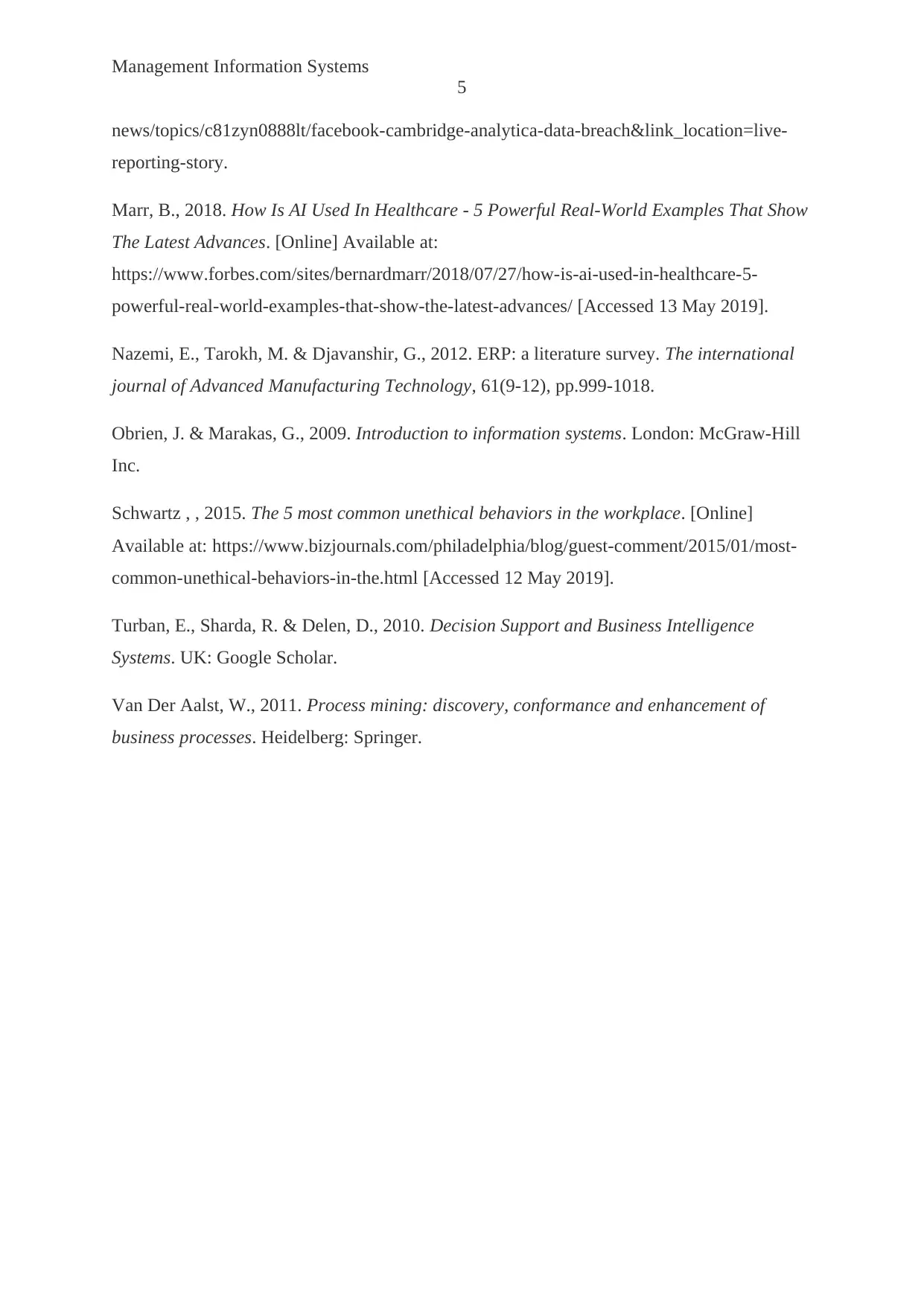
Management Information Systems
5
news/topics/c81zyn0888lt/facebook-cambridge-analytica-data-breach&link_location=live-
reporting-story.
Marr, B., 2018. How Is AI Used In Healthcare - 5 Powerful Real-World Examples That Show
The Latest Advances. [Online] Available at:
https://www.forbes.com/sites/bernardmarr/2018/07/27/how-is-ai-used-in-healthcare-5-
powerful-real-world-examples-that-show-the-latest-advances/ [Accessed 13 May 2019].
Nazemi, E., Tarokh, M. & Djavanshir, G., 2012. ERP: a literature survey. The international
journal of Advanced Manufacturing Technology, 61(9-12), pp.999-1018.
Obrien, J. & Marakas, G., 2009. Introduction to information systems. London: McGraw-Hill
Inc.
Schwartz , , 2015. The 5 most common unethical behaviors in the workplace. [Online]
Available at: https://www.bizjournals.com/philadelphia/blog/guest-comment/2015/01/most-
common-unethical-behaviors-in-the.html [Accessed 12 May 2019].
Turban, E., Sharda, R. & Delen, D., 2010. Decision Support and Business Intelligence
Systems. UK: Google Scholar.
Van Der Aalst, W., 2011. Process mining: discovery, conformance and enhancement of
business processes. Heidelberg: Springer.
5
news/topics/c81zyn0888lt/facebook-cambridge-analytica-data-breach&link_location=live-
reporting-story.
Marr, B., 2018. How Is AI Used In Healthcare - 5 Powerful Real-World Examples That Show
The Latest Advances. [Online] Available at:
https://www.forbes.com/sites/bernardmarr/2018/07/27/how-is-ai-used-in-healthcare-5-
powerful-real-world-examples-that-show-the-latest-advances/ [Accessed 13 May 2019].
Nazemi, E., Tarokh, M. & Djavanshir, G., 2012. ERP: a literature survey. The international
journal of Advanced Manufacturing Technology, 61(9-12), pp.999-1018.
Obrien, J. & Marakas, G., 2009. Introduction to information systems. London: McGraw-Hill
Inc.
Schwartz , , 2015. The 5 most common unethical behaviors in the workplace. [Online]
Available at: https://www.bizjournals.com/philadelphia/blog/guest-comment/2015/01/most-
common-unethical-behaviors-in-the.html [Accessed 12 May 2019].
Turban, E., Sharda, R. & Delen, D., 2010. Decision Support and Business Intelligence
Systems. UK: Google Scholar.
Van Der Aalst, W., 2011. Process mining: discovery, conformance and enhancement of
business processes. Heidelberg: Springer.
⊘ This is a preview!⊘
Do you want full access?
Subscribe today to unlock all pages.

Trusted by 1+ million students worldwide
1 out of 6
Related Documents
Your All-in-One AI-Powered Toolkit for Academic Success.
+13062052269
info@desklib.com
Available 24*7 on WhatsApp / Email
![[object Object]](/_next/static/media/star-bottom.7253800d.svg)
Unlock your academic potential
Copyright © 2020–2026 A2Z Services. All Rights Reserved. Developed and managed by ZUCOL.





